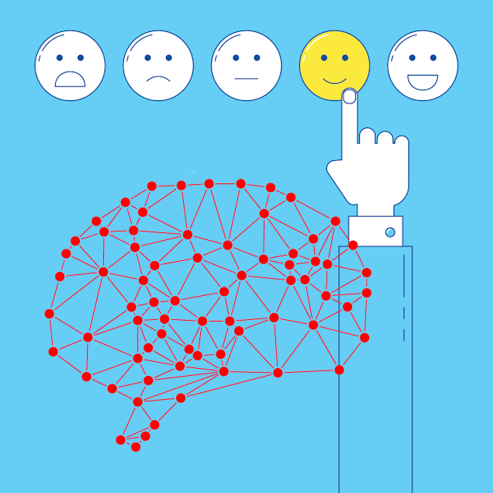Some pundits have predicted the COVID-19 pandemic will bring an end to the experience economy. Early indications are the experience economy may be slowed but it is certainly not dying. One area where experience still matters is customer experience (CX). Abhishek Bhate, Managing Director at Wurth-IT, reports, “A Walker study says that by 2020, customer experience will overtake price and product behavior as the key brand differentiator. However, a good customer experience itself depends upon a huge number of factors. An omnichannel world has meant that companies find it increasingly challenging to maintain consistent customer experience across multiple channels such as voice, web, chat or email.”[1] According to numerous subject matter experts, the key to better customer experience is cognitive technologies. The editorial team at insideBIGDATA notes, “Today’s customer experience is practically unrecognizable from just a few years earlier. We’re able to cancel orders without ever speaking to a human, get essential supplies delivered to our door just by talking to a speaker, and get pitch-perfect recommendations wherever we go online. Not only has AI transformed the purchasing journey for the consumer, but on the brand side as well.”[2]
Benefits of cognitive technologies in the area of customer experience
Louis Columbus (@LouisColumbus), a Principal at IQMS, reports, “30% of customers will leave a brand and never come back because of a bad experience. [And] 27% of companies say improving their customer intelligence and data efforts are their highest priority when it comes to customer experience.”[3] One way to improve customer experience is to employ cognitive technology solutions. “Artificial Intelligence has been around for a while in the realm of SciFi,” writes, Hutch Morzaria (@cxmaster), a customer experience expert. “However, we are seeing it more and more in the world of business.”[4] He continues, “As we keep adding more and more features to AI technology, its benefits become more visible and spreadable. Customer service is one of the areas that can rely heavily on AI if set up correctly.” He sees seven benefits of cognitive technologies in the area of customer experience. They are:
1. Handling Large Volumes of Data. Morzaria observes that companies now collect oceans of data about customers. “But,” he writes, “obtaining such huge amounts of data would be useless without AI. Humans can’t process endless amounts of data. … By processing data with AI, it is possible to obtain powerful insights and predictions about customers’ behaviors.”
2. Reducing Average Handling Time (AHT). Morzaria reminds us that customers hate to wait to receive service. “Nowadays,” he writes, “chatbots answer basic inquiries and requests immediately. Customers also get reminders and notifications in advance. They can receive their products in 24 hours or less and can track them easily through delivery systems and programs.”
3. Customizing Products Offerings to Drive Up Sales. Personalization is one of the well-known characteristics of the current retail environment. Morzaria writes, “Customization is the new frontier of customer service. As customers already know they can get it, they demand it more and more.”
4. Achieving Effective Omnichannel Presence. The novel coronavirus pandemic accelerated online shopping and underscored the importance of omnichannel strategies for retailers and brands. Morzaria observes, “Multiple channels also brought new challenges as they represent a lot of data and channels to cover. In this sense, AI became the ideal way to handle them all.”
5. Creating a Positive and Seamless Experience with a Company. “As companies implement AI tools through their operations,” Morzaria writes, “customers have the opportunity to improve their interaction. This is to say that when every touchpoint includes an AI, the entire process becomes easier to handle.”
6. Optimizing Resources. Most organizations understand cognitive technologies excel at helping them optimize operations. Morzaria adds, “When businesses use AI in customer service areas, their resources automatically reach an optimal balance.”
7. Having 24/7 Availability. New York is famous as “the city that never sleeps.” The internet means the world never sleeps. Morzaria explains, “Offering 24/7 availability is particularly important for global companies as they have customers from all over the world in different time zones. Moreover, customers have new patterns of behavior because they use different schedules to sleep and work. Consequently, they need different ways to communicate and interact with customer service areas. AI is the solution because this technology can be connected and interacting 24/7 during the entire year.”
Where cognitive technologies help CX the most
Columbus notes, “The hard reset every company is going through today is making senior management teams re-evaluate every line item and expense, especially in marketing. Spending on Customer Experience is getting re-evaluated as are supporting AI, analytics, business intelligence (BI), and machine learning projects and spending.” He reports a study by KPMG asks the question, “How Much Is Customer Experience Worth?” The study concludes, “There is strong evidence of a positive relationship between customer experience and revenue. … Under-delivering on customer experience has a much higher negative impact on a company’s revenue than over-delivering has a positive impact.” Columbus concludes, “That’s a powerful argument for having AI and machine learning ingrained into CX company-wide.” Columbus asserts there are six areas in which cognitive technologies can improve customer experience. Some of them overlap with Morzaria’s discussion.
- “Improving contactless personalized customer care is considered one of the most valuable areas where AI is improving customer experiences. These ‘need to do’ marketing areas have the highest complexity and highest benefit.”
- “Anticipating and predicting how each customers’ preferences of where, when, and what they will buy will change and removing roadblocks well ahead of time for them. Reducing the friction customers face when they’re attempting to buy within a channel they’ve never purchased through before can’t be left to chance.”
- “Knowing which customer touchpoints are the most and least effective in improving CX and driving repurchase rates. Successfully using AI to improve CX needs to be based on data from all trackable channels that prospects and customers interact with. Digital touchpoints, including mobile app usage, social media, and website visits, all need to be aggregated into data sets ML algorithms to use to learn more about every Customer continually and anticipate which touchpoint is the most valuable to them and why.”
- “Recruiting new customer segments by using CX improvements to gain them as prospects and then convert them to customers. AI and ML have been used for customer segmentation for years.”
- “Retailers are combining personalization, AI-based pattern matching, and product-based recommendation engines in their mobile apps enabling shoppers to try on garments they’re interested in buying virtually.”
- “Relying on AI to best understand customers and redefine IT and Operations Management infrastructure to support them is a true test of how customer-centric a business is.”
Concluding thoughts
Morzaria concludes, “AI is coming. It’s somewhat inevitable. While the impact will be felt in many industries and businesses, from a customer perspective it is almost entirely positive.” Bhate adds, “AI’s ability to learn and unlearn from data gives organizations the unique ability to take customer experience to the next level. From personalized alerts to predicting buying behavior, AI can help in creating greater opportunities for organizations.”
Footnotes
[1] Abhishek Bhate, “Cognitive Technologies: The defining factor for next-gen customer experiences,” Express Computer, 19 may 2020.
[2] Editorial Team, “How AI is Transforming the Customer Experience,” insideBIGDATA, 29 March 2020.
[3] Louis Columbus, “Six Areas Where AI Is Improving Customer Experiences,” Forbes, 29 April 2020.
[4] Hutch Morzaria, “The 7 Benefits of AI in Customer Service,” Business to Community, 13 April 2020.





